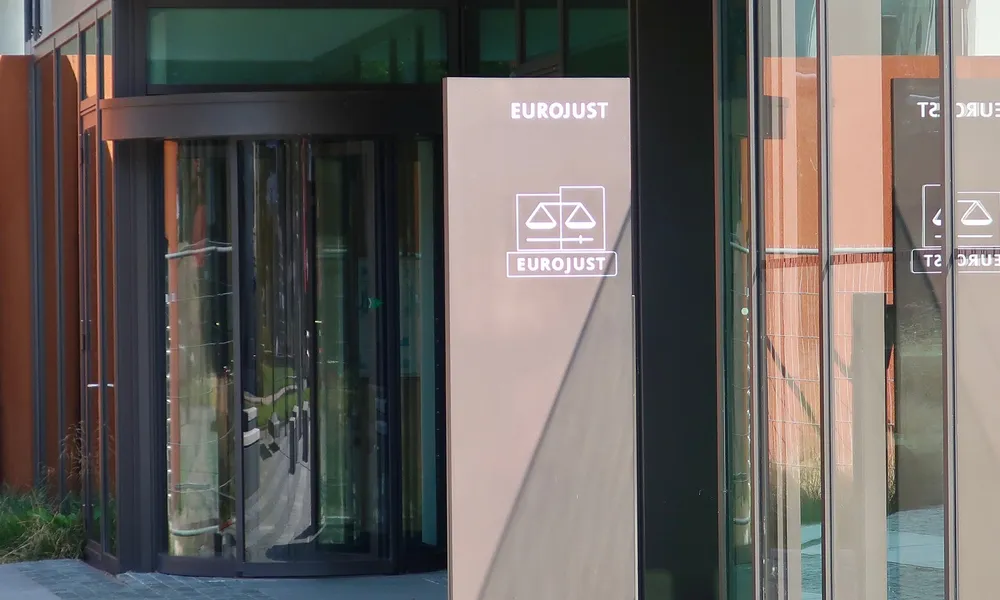By Yiannis Pazouros and Niki Laou
Eurojust has confirmed Politis’ front-page report through an official statement, verifying the large-scale investigation into a multinational fraud case spanning at least three countries. In its announcement, Eurojust referred to nine arrests carried out in Cyprus, Spain, and Germany in connection with a criminal network that laundered more than €600 million through cryptocurrency schemes.

Politis had previously revealed that Cyprus is at the center of a joint investigation between Belgium, France, and Cyprus into a fraud scheme exceeding €700 million, with at least seven arrests and Limassol identified as a central operational hub. The report described a network of affiliate marketing that sold fake investments and promoted illegal online casinos, using call centers that targeted victims mainly in France and Belgium. It also confirmed large-scale seizures of digital data, frozen accounts, and searches of dozens of companies based in Limassol.
Eurojust's released report:
Decisive actions against cryptocurrency scammers earning over EUR 600 million
Nine people suspected of money laundering have been arrested during a synchronised operation that took place in three countries at the same time. The suspects set up a cryptocurrency money laundering network that scammed victims out of over EUR 600 million. Eurojust, the EU’s judicial cooperation hub, ensured that French, Belgian, Cypriot, German and Spanish authorities worked together to take the network down.
The members of the network created dozens of fake cryptocurrency investment platforms that looked like legitimate websites and promised high returns. They recruited their victims using a variety of methods such as social media advertising, cold calling, fake news articles and fake testimonials from celebrities or successful investors.
When victims would transfer cryptocurrency to the platforms, they were never able to recover their money. The crypto assets earned through the various scams were then laundered using blockchain technology. The criminals were able to launder approximately EUR 600 million.
Investigations into the network started when authorities received several complaints from victims. Eurojust ensured that the authorities were able to work together in a fast and efficient manner by setting up a joint investigation team between French and Belgian authorities. As other countries had to be involved during the actions, Eurojust brought prosecutors and investigative judges from France, Belgium, Cyprus, Spain and Germany together to plan the takedown of the network.
Actions against the suspects took place on 27 and 29 October and were coordinated from the Eurojust premises in The Hague. Nine suspects were arrested at their homes in Cyprus, Spain and Germany on suspicion of their involvement in money laundering from fraudulent activities. At the same time, searches took place that resulted in the seizure of EUR 800 000 in bank accounts, EUR 415 000 in cryptocurrencies and EUR 300 000 in cash.
The actions were carried out by the following authorities:
- France: Investigative Judge of the Court of Paris JUNALCO (National Jurisdiction against Organised Crime) - Cybercrime Unit; Gendarmerie Nationale - Cyber Unit
- Belgium: PPO Limburg; Investigating Judge of the Court of 1st Instance in Limburg; Federal Judicial Police Limburg
- Cyprus: Attorney General's Office; MOKAS; Cyprus Police
- Germany: Public Prosecutor’s Office Cologne; Cologne Criminal Police
- Spain: PPO Barcelona - International Cooperation Section; Investigative Court num 5 in Vilanova i la Geltrú; Mossos d’Esquadra (Cybercrime Central Area); Policía Nacional (Cybercrime Central Unit and Barcelona and Oviedo Provincial Brigade of Judicial Police)
